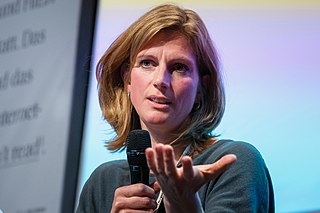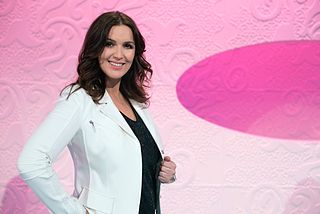
Claudio Magris is an Italian scholar, translator and writer. He was a senator for Friuli-Venezia Giulia from 1994 to 1996.

Cosima Arabella-Asereba Kiesbauer, known professionally as Arabella Kiesbauer, is an Austrian born German-Austrian TV presenter, writer and actress. She grew up in Vienna with her grandmother after her mother Hannelore and her father Sammy Ammissah separated.

Walter Jens was a German philologist, literature historian, critic, university professor and writer.

Claudia Kemfert is a German economics expert in the areas of energy research and environmental protection. She is a Professor of Energy Economics and Sustainability at the Hertie School of Governance in Berlin. She heads the Energy, Transportation, and Environment department at the German Institute for Economic Research.

Wilfried Brauer was a German computer scientist and professor emeritus at Technical University of Munich.

Irenäus Eibl-Eibesfeldt was an Austrian ethologist in the field of human ethology. In authoring the book which bears that title, he applied ethology to humans by studying them in a perspective more common to volumes studying animal behavior.
Christian Lerch is a journalist and radio documentary producer based in Vienna, Austria and Berlin, Germany.
Angelika Neuwirth is a German Islamic studies scholar and professor of Quranic studies at Freie University in Berlin.
Verena Winiwarter is an Austrian environmental historian. She has held the office of Dean of the Faculty for Interdisciplinary Studies at the Alpen-Adria-Universität Klagenfurt since 2010. Her research focus is on the environmental history of agrarian societies and on Austrian environmental history, as well as the philosophy of science of inter- and transdisciplinary research.
Albert Joseph Maria Defant was an Italian-Austrian meteorologist, oceanographer and climatologist. He published fundamental works on the physics of the atmosphere and ocean and is regarded as one of the founders of physical oceanography.
Sabine Schmidtke is a German academic, historian, and scholar of Islamic studies. She is Professor of Islamic Intellectual History at the Institute for Advanced Study in Princeton. Schmidtke was elected Member to the American Philosophical Society in 2017. She was appointed Corresponding Member of the Austrian Academy of Sciences in 2021.

Jürgen Kriz is a German psychologist, psychotherapist and emeritus professor for psychotherapy and clinical psychology at the Osnabrück University, Germany. He is a prominent thinker in systems theory and the founder of the person-centered systems theory – a multi-level concept for the understanding of processes in psychotherapy, counseling, coaching and clinical psychology.
Tilmann Buddensieg was a German art historian.

Erika Weinzierl was an Austrian historian, gender researcher, and historian of Nazism. A member of the Austrian People's Party and the Curatorium of the Austrian Mauthausen Committee, she was the second director of the Department of Contemporary History of the University of Vienna, succeeding Ludwig Jedlicka. Weinzierl was a recipient of the Austrian Decoration for Science and Art, the Preis der Stadt Wien für Geisteswissenschaften, the Benemerenti medal, and the Theodor Körner Prize.

Ernst Hiesmayr was an Austrian architect, artist and former rector of the Technical University Vienna.
Kerstin Susanne Jobst is a German historian and professor. Since 2012 she has taught at the Institute for East European History at the University of Vienna.

Maja Göpel is a German political economist, transformation researcher, and sustainability scientist with a focus on transdisciplinary work. As a speaker and author, she has increasingly specialised in science communication since 2019 when she co-founded the Scientists for Future initiative. Göpel is an honorary professor at Leuphana University of Lüneburg.
Angelika Schaser is a German historian.

Barbara Karlich is an Austrian television presenter, journalist and publicist.
Liliane Weissberg is an American literary scholar and cultural historian specializing in German-Jewish studies and German and American literature. She is currently the Christopher H. Browne Distinguished Professor in Arts and Sciences and Professor of German and Comparative Literature at the University of Pennsylvania. She received, among others, a Guggenheim Fellowship, the Humboldt Research Award for her research on German-Jewish literature and culture and the Berlin Prize of the American Academy in Berlin, and holds an honorary degree from the University of Graz.












